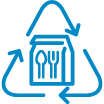- Home
- Sustainability
- Sustainability in the Nisshin Seifun Group
- Sustainability Priorities (materiality)
Sustainability Priorities (materiality)
One of our management strategies calls for the pursuit of sustainable cyclical growth* through initiatives in five areas identified as sustainability priorities.
* Cyclical growth: The achievement of sustainable growth through a cycle in which social issues are approached as business opportunities, and the value created by business contributes to society
Identifying our Sustainability priorities
We have identified sustainability priorities for the Nisshin Seifun Group with the aim of focusing our initiatives toward the social issues that most concern our stakeholders. The sustainability priorities will be reviewed regularly based on changes in the social environment.
Adopted March 26, 2019
Process for identifying Sustainability priorities
We identified approximately 60 issues with the cooperation of experts, using the following procedures.
-
STEP 1
Examine issues based on international norms and surveys of ESG evaluation organizations.
We compiled a list of candidate issues, with reference to the GRI standards, ISO26000, evaluation items used by ESG evaluation organizations, case studies from other companies, and other information.
-
STEP 2
Organize the issues by analyzing value chains.
We identified issues in the value chains for key businesses by ascertaining the status of processes, procured goods, and workers through interviews with business divisions and factory visits.
-
STEP 3
Assess stakeholder interest.
We rated stakeholder interest on three levels (high, medium, low) based on assessments by ESG evaluation organizations, questions from NGOs, and other information.
-
STEP 4
Assess the potential impact on our business.
Using the same methodology as the assessment of stakeholder interest in Step 3, we rated issues on three levels according to their impact on business and arranged them on a matrix chart.
Sustainability priorities (materiality) for the Nisshin Seifun Group
We sorted the approximately 60 issues in the matrix chart into five key areas based on the direction of our future initiatives.
These were then summarized into the Nisshin Group sustainability priorities listed below.

Provide safe and healthy food and responsible consumer communication
Identifying social issues and providing value

Risks
- Loss of social reputation and stakeholder confidence due to quality-related incidents or other issues
- Loss of growth opportunities due to delays in responding to the health needs of consumers
Opportunities
- Gaining the trust of consumers through the supply of safe, reliable products
- Creation of opportunities through the enhancement or development of products based on consumer feedback
- Expansion of business opportunities linked to rising health consciousness
Targets for priority themes
| Priority themes | Approaches and targets | Initiatives on priority themes |
|---|---|---|
| Ensuring food safety | Implement quality assurance from the viewpoint of consumers and continually strengthen the quality assurance system
|
|
| Responsible consumer communication | Provide fair and responsible consumer communication
|
|
| Contribution to healthy diets | Research and develop health functions of food ingredients, primarily focused on wheat, such as its effectiveness in preventing metabolic syndrome and promoting brain functions and anti-aging. |

Enable secure and sustainable raw material procurement
Identifying social issues and providing value

Risks
- Impact of climate change or other factors on our ability to procure wheat
- Procurement problems or impairment of corporate value due to environmental or human rights issues in our supply chains
- Slowdown or disruption of supplies of raw materials due to natural disasters, epidemics, or geopolitical risks, such as conflicts
Opportunities
- Creation of structures to support stable supplies of safe, reliable products and services
Targets for priority themes
| Priority themes | Approaches and targets | Initiatives on priority themes |
|---|---|---|
| Ensuring stable wheat procurement | Establish sustainable procurement of wheat, our primary raw material
|
|
| Sustainable raw material procurement | Promote responsible procurement activities based on fair and ethical transactions
|

Efficiently handle product and packaging waste
Identifying social issues and providing value
While many people in the world are still affected by hunger and poverty, food losses also continue to be a major problem. Another problem is plastic waste from packaging, which has low recovery and effective utilization ratios compared with metals and other materials. There is growing concern about pollution on a global scale caused by the release of this plastic waste into rivers and oceans.
One of our most important priorities as a food manufacturer is to minimize food waste and plastic waste through efforts to create system to reuse and recycle these materials in a sustainable manner. The Nisshin Seifun Group has been working actively for many years to reduce waste emissions and recycle resources. We have set medium-term targets for the further reduction of environmental loads, including measures to minimize food and packaging waste. We will continue to contribute to the realization of a sustainable society in cooperation with our partners at all stages of our supply chains.

Risks
- Higher compliance costs resulting from changes to or strengthening of laws and regulations relating to waste and resource recycling
- Loss of stakeholder confidence due to delays in actions to reduce waste and recycle resources
Opportunities
- Efficiency improvements and cost reductions resulting from waste reduction initiatives
- Expansion of business opportunities through the development of environmentally responsible products
Targets for priority themes
| Priority themes | Approaches and targets | Initiatives on priority themes |
|---|---|---|
| Reducing food waste | Reduce food waste and contribute to realizing sustainable food systems
|
|
| Reducing packaging waste | Promote the 3Rs (reduce, reuse, and recycle) + renewables with our partners at all supply chain stages
|
- *1 At Group companies in Japan. Initio Foods Inc., Joyous Foods Co., Ltd., and Tokatsu Foods Co., Ltd., compared to fiscal 2020
- *2 Group companies in Japan

Address climate change and water resource issues
Identifying social issues and providing value
The impact of climate change is becoming more serious year after year.. This global-scale issue is affecting society, the environment, and business across multiple generations. We are already witnessing extreme weather events caused by rising temperatures. There is also a threat of water shortages due to changing rainfall patterns and population growth. The Nisshin Seifun Group is also at risk of climate change impacts at all stages of our supply chains, including raw material procurement and logistics, due to natural disasters affecting our business sites and the areas where wheat and other raw materials are produced.
Today the survival of businesses depends on their ability to adapt to climate change and water problems. We aim to reduce CO2 emissions at our operation sites to net zero by 2050 by accelerating our initiatives, such as energy-saving measures, the improvement of production efficiency, and the introduction of renewable energy sources. Our contributions to the realization of a decarbonized society will also include efforts to reduce CO2 emissions across our supply chains. In addition, we will continue to monitor water risks in raw material production areas and at our operation sites, while also working to reduce water consumption at our production sites, and cooperating with our partners to ensure the effective utilization of water at all stages of our supply chains.

Risks
- Increased intensity and frequency of natural disasters, rising temperatures, and water shortages that could impact our ability to operate production sites and affect procurement of raw materials
- Increased costs relating to regulations, including carbon taxes
- Loss of stakeholder confidence due to a slow response to climate change and water problems
Opportunities
- Expansion of business opportunities through increased demand for sustainable, environmentally responsible products and services
Targets for priority themes
| Priority themes | Approaches and targets | Initiatives on priority themes |
|---|---|---|
| Climate change adaptation and mitigation | Introduce energy-saving technology and promote the use of renewable energy, and contribute to realizing a decarbonized society
|
|
| Water resource conservation | Work with our partners to ensure effective utilization of water at all stages of our supply chain
|
- *3 All Group companies in Japan and overseas

Provide working environments that are healthy and fulfilling
Identifying social issues and providing value

Risks
- Labor shortages caused by reduced competitiveness in the recruitment market and the departure of existing employees
- Impact on business continuity due to increases in occupational accidents and heightened employee health risks
Opportunities
- Employee retention through the improvement of work motivation and job satisfaction
- Innovation and corporate growth resulting from the activities of diverse human resources
Targets for priority themes
| Priority themes | Approaches and targets | Initiatives on priority themes |
|---|---|---|
| Respect for diversity | Respect humanity and diversity, and create workplaces that consider work-life balance
|
|
| Cultivation of human resources | Cultivate human resources so each person can grow and fulfill their potential
|
|
| Employee working environments and health |
|







